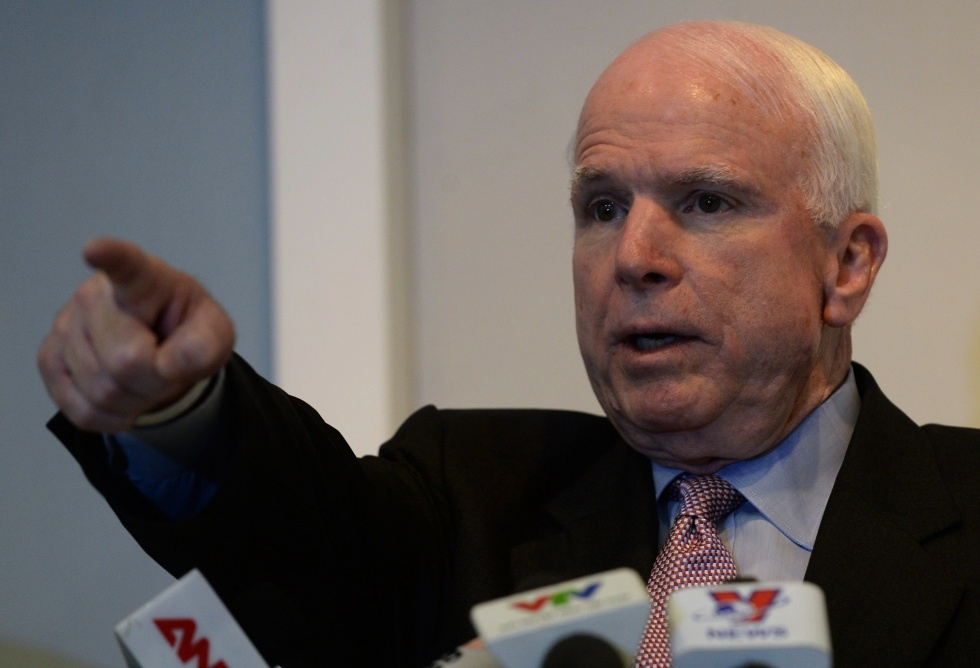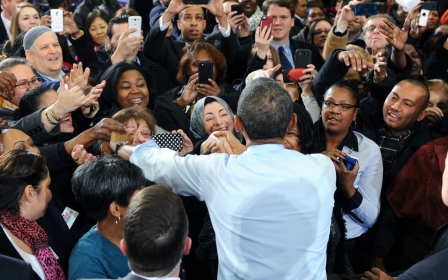The cowboys return to America

President Obama and the Democratic Party were swept into office in 2008 with a clear mandate from the American people: bring an end to the costly misadventures in Iraq and Afghanistan.
Six years later, American voters have awarded the Republican Party unilateral control of US Congress, which marks for the first time since 2006 that conservatives have wielded such legislative power.
Exit polls indicate that terrorism was one of the top issues weighing most on the minds of voters, as violence continues to escalate in Iraq and Syria. According to the Pew Research Centre, 3 out of 4 voters said ISIS and terrorism were key deciding factors for their vote. By large margins, the average American voter has more faith in Republicans when it comes to matters of foreign policy, which is a reminder that six years is a lifetime in electoral politics. So what does a Republican controlled Congress mean for the Middle East?
In short, it means a lot. It means a return to the hyper-masculine, cowboy strutting America. It means a posture that looks more like John Wayne’s and less like Nelson Mandela’s. Republican voters will demand a tougher stance in the Middle East because it’s toughness they want. They’re done with Obama’s ‘talk first, shoot later’ foreign policy - or as they like to mock, “leading from behind.” Republicans want “bomb, baby,bomb.”
A Pew Research survey says that 77 percent of Republicans do not believe Obama is tough enough on foreign policy issues. What is even more telling is that one year ago, only 18 percent of Republicans thought the US did too little to help solve the world’s problems. “Today, 46% of Republicans think the US does too little to solve global problems,” which is an extraordinary shift in sentiment in a short period of time.
In a recent op-ed, Tom Engelhardt referred to the 2014 midterms as the “escalation election.” He warned that a GOP controlled congress would fundamentally shift the US debate on foreign policy. “You’re going to hear far more about protecting Americans from everything that endangers them least, and especially about the need for a pusillanimous president (or so he was labelled by a range of Republicans this campaign season) to buckle down, up the ante, and crush the Islamic State, that extreme Islamist mini-oil regime in the middle of an increasingly fragmented, chaotic Middle East,” he writes. “You already know the tune: more planes, more drones, more bombs, more special ops forces, more advisers, and more boots on the ground. After 13 years of testing, the recipe is tried and true, and its predictably disastrous results will only ensure far more hysteria in our future. And count on this: oppositional pressure to escalate, heading into the presidential campaign season, will be a significant factor in Washington "debates" in the last years of the Obama administration.”
Before you dismiss Engelhardt’s prose as partisan hyperbole, 2012 Republican presidential candidate Ron Paul (R-TX) tweeted, “Republican control of the Senate = expanded neocon wars in Syria and Iraq. Boots on the ground are coming!”
President Obama is confronted with a smorgasbord of dilemmas in the Middle East, including the civil wars in Iraq and Syria, the probability for a third Palestinian intifada, the awakening of the Arab Spring, and a nuclear desirous Iran. These are all parts of long term problems, so how has Obama fared in dealing with all so far?
“President Obama’s approach to the Middle East has been distant from the outset. He has wanted to improve America’s image in the Muslim world and feels that the best way to do this is to end America’s unpopular wars there. His modus operandi has been disengagement: end existing commitments, foremost among them Iraq and Afghanistan, and avoid new entanglements,” writes Vali Nasr, a former State Department advisor, in The Dispensable Nation: American Foreign Policy in Retreat.
Nasr says the general verdict on the Obama administration’s policy is that “it has not done too badly.” He pointed out “there are no blatant mistakes, bleeding gashes, or crippling crises,” but also warns “the Obama Administration has neither come up with a strategy for capitalising on the opportunity that the Arab Spring presented nor adequately prepared for potential fallout in the form of regional rivalry, the explosion of sectarian tensions, and deep-rooted economic crises.”
Obama’s posture towards the Middle East has been described as “lean back and wait” and “reactive.” Congressional Republicans, however, will likely drag him towards their more hawkish sensibilities. According to Pew, “57 percent (including 65 percent of Tea Party members) favour sending US ground troops into the Middle East to deal with ISIS, while 66 percent of Democrats oppose such an escalation.”
In an op-ed for Foreign Policy, Bruce Stokes, who is director of global economic attitudes at the Pew Research Centre, uses polling data - that highlights the gulf between attitudes held by Democrats and Republicans - to underscore the forthcoming hawkish pressures on Obama.
“Republicans are more worried about Tehran's nuclear capability than are Democrats: 74 percent of GOP voters, but only 56 percent of Democrats, say Iran's nuclear program is a major threat to the United States,” notes Stokes. Republicans are also more sceptical about Tehran's intentions. 73 percent of Republicans but only 48 percent of Democrats believe the Iranians are bluffing when it comes to addressing international concerns about their country's nuclear enrichment program.
“This may result in serious domestic headwinds for the administration's push to secure a nuclear deal. Republican congressional hawks will have support from their base to challenge any Iranian agreement, either pushing for an escalation of economic sanctions or even military action,” writes Stokes.
With tensions ratcheting up yet again in Israel and the Occupied Territories, and with a third intifada seemingly inevitable, a US response will again be required. According to Pew Research, “Republicans (60 percent) are more likely than Democrats (44 percent) to see the conflict as a major threat to the United States. And a 45 percent plurality of GOP voters say that Obama favours the Palestinians too much, while 71 percent of Democrats think he has struck a balance between Palestinians and Israel.”
The day after Election Day, and with the next congress still nearly three months from forming, Obama spoke in a clearly more aggressive tone, which foretells of a more aggressive posture by the US in the near future. On Wednesday, he promised to expand strikes against ISIS, and according the Senate’s top Republican, Mitch McConnell (R-KY), the administration’s “effort to arm and train moderate Syrian rebels will be on the agenda” when congressional leaders meet with the President on Friday.
In his speech to the people of Middle East during the height of the Arab Spring, President Obama said, “Our support for these principles [human rights and democratic, peaceful demands for political freedom and economic opportunity, and legitimate aspirations of people] is a top priority and central to the pursuit of other interests in the region. The US will marshal all our diplomatic, economic, and strategic tools to support these principles.”
The question is: Will Republicans push the tools of the military over and above “our diplomatic, economic, and strategic tools?” If elected Republicans stay true to their constituents, the answer to that question is self-evident.
- CJ Werleman is an opinion writer for Salon, Alternet, and the author of Crucifying America, and God Hates You. Hate Him Back. Follow him on twitter: @cjwerleman
The views expressed in this article belong to the author and do not necessarily reflect the editorial policy of Middle East Eye.
Photo: US senator John McCain takes questions during a press conference in Hanoi on 8 August, 2014
New MEE newsletter: Jerusalem Dispatch
Sign up to get the latest insights and analysis on Israel-Palestine, alongside Turkey Unpacked and other MEE newsletters
Middle East Eye delivers independent and unrivalled coverage and analysis of the Middle East, North Africa and beyond. To learn more about republishing this content and the associated fees, please fill out this form. More about MEE can be found here.





